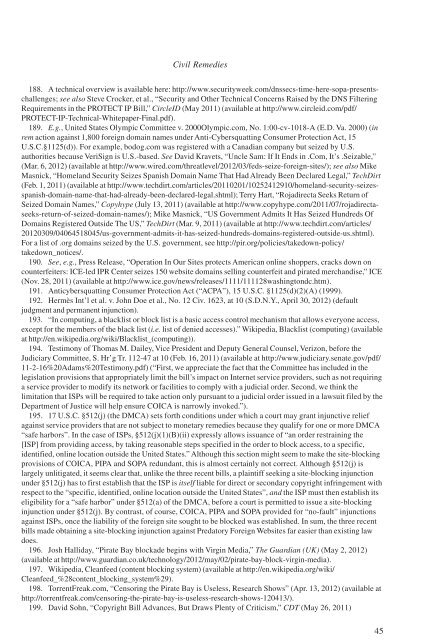1oz61wa
1oz61wa
1oz61wa
You also want an ePaper? Increase the reach of your titles
YUMPU automatically turns print PDFs into web optimized ePapers that Google loves.
Civil Remedies<br />
188. A technical overview is available here: http://www.securityweek.com/dnssecs-time-here-sopa-presentschallenges;<br />
see also Steve Crocker, et al., “Security and Other Technical Concerns Raised by the DNS Filtering<br />
Requirements in the PROTECT IP Bill,” CircleID (May 2011) (available at http://www.circleid.com/pdf/<br />
PROTECT-IP-Technical-Whitepaper-Final.pdf).<br />
189. E.g., United States Olympic Committee v. 2000Olympic.com, No. 1:00-cv-1018-A (E.D. Va. 2000) (in<br />
rem action against 1,800 foreign domain names under Anti-Cybersquatting Consumer Protection Act, 15<br />
U.S.C.§1125(d)). For example, bodog.com was registered with a Canadian company but seized by U.S.<br />
authorities because VeriSign is U.S.-based. See David Kravets, “Uncle Sam: If It Ends in .Com, It’s .Seizable,”<br />
(Mar. 6, 2012) (available at http://www.wired.com/threatlevel/2012/03/feds-seize-foreign-sites/); see also Mike<br />
Masnick, “Homeland Security Seizes Spanish Domain Name That Had Already Been Declared Legal,” TechDirt<br />
(Feb. 1, 2011) (available at http://www.techdirt.com/articles/20110201/10252412910/homeland-security-seizesspanish-domain-name-that-had-already-been-declared-legal.shtml);<br />
Terry Hart, “Rojadirecta Seeks Return of<br />
Seized Domain Names,” Copyhype (July 13, 2011) (available at http://www.copyhype.com/2011/07/rojadirectaseeks-return-of-seized-domain-names/);<br />
Mike Masnick, “US Government Admits It Has Seized Hundreds Of<br />
Domains Registered Outside The US,” TechDirt (Mar. 9, 2011) (available at http://www.techdirt.com/articles/<br />
20120309/04064518045/us-government-admits-it-has-seized-hundreds-domains-registered-outside-us.shtml).<br />
For a list of .org domains seized by the U.S. government, see http://pir.org/policies/takedown-policy/<br />
takedown_notices/.<br />
190. See, e.g., Press Release, “Operation In Our Sites protects American online shoppers, cracks down on<br />
counterfeiters: ICE-led IPR Center seizes 150 website domains selling counterfeit and pirated merchandise,” ICE<br />
(Nov. 28, 2011) (available at http://www.ice.gov/news/releases/1111/111128washingtondc.htm).<br />
191. Anticybersquatting Consumer Protection Act (“ACPA”), 15 U.S.C. §1125(d)(2)(A) (1999).<br />
192. Hermès Int’l et al. v. John Doe et al., No. 12 Civ. 1623, at 10 (S.D.N.Y., April 30, 2012) (default<br />
judgment and permanent injunction).<br />
193. “In computing, a blacklist or block list is a basic access control mechanism that allows everyone access,<br />
except for the members of the black list (i.e. list of denied accesses).” Wikipedia, Blacklist (computing) (available<br />
at http://en.wikipedia.org/wiki/Blacklist_(computing)).<br />
194. Testimony of Thomas M. Dailey, Vice President and Deputy General Counsel, Verizon, before the<br />
Judiciary Committee, S. Hr’g Tr. 112-47 at 10 (Feb. 16, 2011) (available at http://www.judiciary.senate.gov/pdf/<br />
11-2-16%20Adams%20Testimony.pdf) (“First, we appreciate the fact that the Committee has included in the<br />
legislation provisions that appropriately limit the bill’s impact on Internet service providers, such as not requiring<br />
a service provider to modify its network or facilities to comply with a judicial order. Second, we think the<br />
limitation that ISPs will be required to take action only pursuant to a judicial order issued in a lawsuit filed by the<br />
Department of Justice will help ensure COICA is narrowly invoked.”).<br />
195. 17 U.S.C. §512(j) (the DMCA) sets forth conditions under which a court may grant injunctive relief<br />
against service providers that are not subject to monetary remedies because they qualify for one or more DMCA<br />
“safe harbors”. In the case of ISPs, §512(j)(1)(B)(ii) expressly allows issuance of “an order restraining the<br />
[ISP] from providing access, by taking reasonable steps specified in the order to block access, to a specific,<br />
identified, online location outside the United States.” Although this section might seem to make the site-blocking<br />
provisions of COICA, PIPA and SOPA redundant, this is almost certainly not correct. Although §512(j) is<br />
largely unlitigated, it seems clear that, unlike the three recent bills, a plaintiff seeking a site-blocking injunction<br />
under §512(j) has to first establish that the ISP is itself liable for direct or secondary copyright infringement with<br />
respect to the “specific, identified, online location outside the United States”, and the ISP must then establish its<br />
eligibility for a “safe harbor” under §512(a) of the DMCA, before a court is permitted to issue a site-blocking<br />
injunction under §512(j). By contrast, of course, COICA, PIPA and SOPA provided for “no-fault” injunctions<br />
against ISPs, once the liability of the foreign site sought to be blocked was established. In sum, the three recent<br />
bills made obtaining a site-blocking injunction against Predatory Foreign Websites far easier than existing law<br />
does.<br />
196. Josh Halliday, “Pirate Bay blockade begins with Virgin Media,” The Guardian (UK) (May 2, 2012)<br />
(available at http://www.guardian.co.uk/technology/2012/may/02/pirate-bay-block-virgin-media).<br />
197. Wikipedia, Cleanfeed (content blocking system) (available at http://en.wikipedia.org/wiki/<br />
Cleanfeed_%28content_blocking_system%29).<br />
198. TorrentFreak.com, “Censoring the Pirate Bay is Useless, Research Shows” (Apr. 13, 2012) (available at<br />
http://torrentfreak.com/censoring-the-pirate-bay-is-useless-research-shows-120413/).<br />
199. David Sohn, “Copyright Bill Advances, But Draws Plenty of Criticism,” CDT (May 26, 2011)<br />
45


